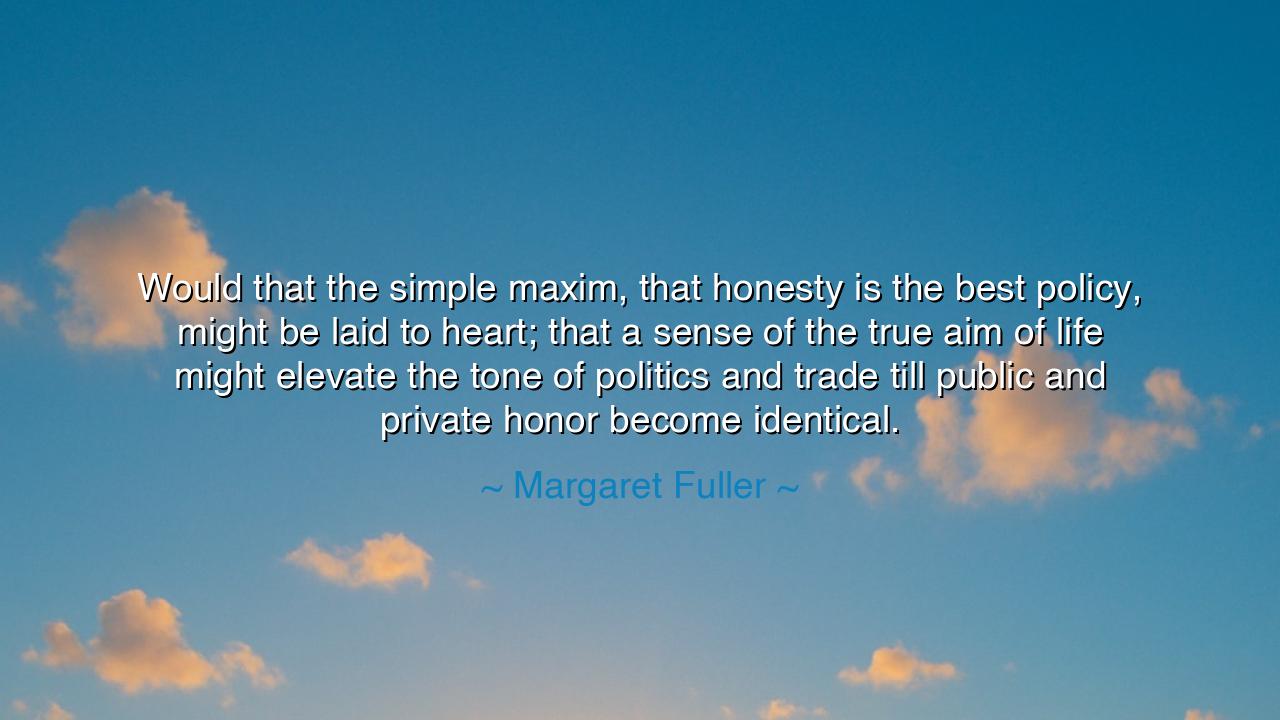
Would that the simple maxim, that honesty is the best policy
Would that the simple maxim, that honesty is the best policy, might be laid to heart; that a sense of the true aim of life might elevate the tone of politics and trade till public and private honor become identical.






The words of Margaret Fuller, “Would that the simple maxim, that honesty is the best policy, might be laid to heart; that a sense of the true aim of life might elevate the tone of politics and trade till public and private honor become identical,” resound as both prayer and command. She calls us back to the eternal truth that honesty is not merely a virtue for the hearth, but the foundation of nations and markets alike. Without it, both politics and trade are poisoned, for where deception reigns, trust dissolves, and with trust gone, no house, no state, no enterprise can endure.
The ancients warned of this long ago. The sages of Greece proclaimed that the just man is the cornerstone of the polis, and Confucius declared that without trust, a ruler cannot stand, for his soldiers will not fight and his people will not follow. Fuller echoes this timeless wisdom, longing for a world where the line between private integrity and public virtue disappears, where a man is not two-faced—honest in his family, deceitful in the market; pious in the temple, corrupt in the senate—but one whole being, upright in all.
History bears clear witness. Consider the life of Abraham Lincoln, whose steadfast reputation as “Honest Abe” became not merely a nickname, but the foundation of his power. In the turbulence of civil war, the people trusted him, not because he promised ease, but because they believed his word was bound to truth. His honesty became both public and private honor, and in that integrity he guided a fractured nation toward preservation. His example reveals the living power of Fuller’s vision.
Yet Fuller’s words also cry out as a lament, for she saw her own age corrupted by greed and ambition, where trade too often exalted profit over principle, and politics bent truth into expediency. Her maxim was both reminder and rebuke: that the “true aim of life” is not accumulation, nor domination, but the pursuit of justice, honor, and harmony. When that aim is restored, she declared, the tone of society itself is lifted, as a song raised to the heavens.
Let the generations remember this: honesty is not weakness, but strength; not naivety, but the most enduring wisdom. Riches built on lies crumble, and power gained through deceit corrodes the hand that holds it. But where truth reigns, both the market and the state are secure, for the people walk in trust and honor binds the mighty. Thus, let public and private virtue be one, and let the simple maxim—honesty is the best policy—be written not only on parchment, but upon the living heart.






BQnguyen tam bao quyen
The aspiration that civic and commercial honor converge raises a tough question: whose definition of honor? Cross-cultural norms differ, and modern information ecosystems blur truth with polished narratives. Maybe we need infrastructure: authenticated records for public statements, independent fact-review tied to procurement scores, and standardized repair protocols when institutions mislead—apology, restitution, corrective action, third-party verification. I’m curious how emerging tech helps or hurts: do cryptographic attestations and audit trails restore confidence, or just create new jargon shields? What evidence would convince skeptics that consistent candor outperforms performative virtue?
QVPHU QUI VO
This makes me think about ordinary habits that either erode or reinforce trust: padding expense reports, ghosting invoices, spinning metrics to look good. Culture is built in the tiny choices no one sees. What rituals help align personal conscience with public role—monthly ethics retros, anonymous internal ombuds channels, and leaders publicly logging decisions with reasons and evidence? I’d appreciate guidance on teaching this early: case studies where telling the unvarnished story unlocked better outcomes. Closed question: should schools require civic honesty labs alongside financial literacy and media literacy?
GHGia Huy
I want to believe moral clarity can lift markets and politics, yet we often reward clever opacity. Investors chase quarterly numbers; campaigns optimize outrage. Could we flip incentives so forthrightness compounds? Ideas: safe-harbor rules for early error admissions, procurement preference for firms with clean audit histories, and campaign finance bonuses for truthful corrections. When truth has short-term costs, who absorbs them—taxpayers, shareholders, voters? Open question: can a jurisdiction prove that radical transparency lowers borrowing costs or corruption enough to justify the immediate pain of exposure?
VKHuynh Van Kha
As a reader, I’m drawn to the practical challenge: how do we make integrity the rational choice, not just the inspirational one? What would it take for government and business to share the same baseline of candor—universal beneficial-ownership registries, real-time contract transparency, standardized lobbyist logs, and clawbacks when leaders mislead? I’d love a simple dashboard that tracks truth-telling outcomes: on-time disclosures, whistleblower case resolution, audit exceptions, and public trust surveys. Closed question: should boards and cabinets tie variable pay or promotions to verified ethics metrics, not just performance targets?